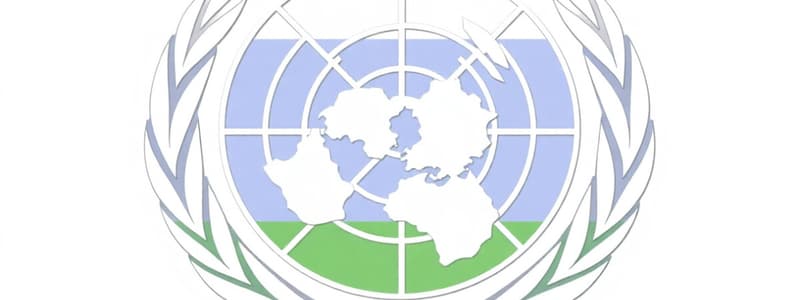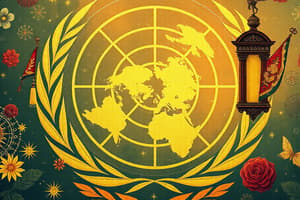Podcast
Questions and Answers
Which of the following is not a United Nations body?
Which of the following is not a United Nations body?
- Security Council
- International Court of Justice
- World Economic Forum (correct)
- General Assembly
The United Nations Assembly meets in New York from September to December each year.
The United Nations Assembly meets in New York from September to December each year.
True (A)
What significant event started the Thirty Years’ War?
What significant event started the Thirty Years’ War?
The Thirty Years’ War began in Europe in 1618.
Match the terms with their descriptions:
Match the terms with their descriptions:
What principle was established by the Peace of Westphalia in 1648?
What principle was established by the Peace of Westphalia in 1648?
What were the main goals of the Congress of Vienna?
What were the main goals of the Congress of Vienna?
World War I lasted from _____ to _____
World War I lasted from _____ to _____
Theory in international relations is used only for describing events.
Theory in international relations is used only for describing events.
What is one of the main actors in the international system?
What is one of the main actors in the international system?
What are the main theories of international relations mentioned?
What are the main theories of international relations mentioned?
What does realism in international relations primarily focus on?
What does realism in international relations primarily focus on?
Flashcards are hidden until you start studying
Study Notes
United Nations Bodies
- There are six main bodies:
- The Security Council
- The General Assembly
- The Economic and Social Council
- The Secretariat (Secretary-General)
- The International Court of Justice
- The Trusteeship Council
General Assembly
- The General Assembly has 193 members
- The Holy See and the State of Palestine are observers
- The Assembly meets in New York
- The main part of the Assembly takes place from September to December
- The resumed part of the Assembly takes place from January to September
The Thirty Years’ War and the Peace of Westphalia
- The Thirty Years’ War (1618–1648) in Europe is considered the beginning of modern international relations
- The Peace of Westphalia (1648):
- Established the principle of sovereignty
- Established the political rights of monarchs
- Laid the groundwork for the formation of the modern nation-state
Sovereignty
- Internal Sovereignty:
- Refers to the monopoly of effective use of force inside a country
- External Sovereignty:
- Refers to the recognition by other states as one of their peers
Congress of Vienna (1814–1815)
- A series of high-level meetings meant to reorganize the European political boundaries after the Napoleonic Wars
- The goal was reestablish the old monarchies and redistribute power among themselves to enable a balance of powers and keep peace
Balance of Power
- It is a concept used to address a rising and threatening actor.
- There are two main strategies:
- Building internal power: Increasing military budget, draft, ...
- Creating an alliance with other concerned nations: This is called the Balance of Power Process.
- The Balance of Power Process:
- The process through which actors put their strength together to counter a rising and threatening actor.
World War I (1914–1918)
- Germany, Austria-Hungary, and the Ottoman Empire against Great Britain, the U.S., France, Russia, Italy, and Japan + smaller powers
- More than 9 million soldiers and 40 million civilians were killed
World War II (1939-1945)
- Approximately 3% of the world population died
- 70-85 Million people died
What is Theory?
- A generalization that simplifies reality by focusing on key variables
- It aims to understand events, explain outcomes, predict future occurrences, and potentially control events
The Nature of Theory
- Theories have assumptions and variables:
- Assumptions are predetermined by an author
- Variables define the essential information a theory considers
Theories of International Relations
- Theories aim to answer key questions:
- Main actors?
- Most important variable?
- Nature of Politics?
- Possibility of Change?
- Level of Analysis?
Main Actors in the International System
- Nation-States
- International Organizations
- Multinational Corporations (MNC)
- Non-governmental Organizations (NGO)
- Non-state actors:
- Individual leaders
- Terrorist groups
- Famous individuals
Levels of Analysis
- Global Level
- Interstate Level
- Domestic Level
- Individual Level
Theories of International Relations
- Realism
- Liberalism
- Constructivism
- Historical Materialism
- Feminism
Comparing Theories of International Relations
- Each theory offers a different perspective:
- Main Actor
- Main Variables
- Nature of Politics
- Possibility of Change
- Level of Analysis
Realism
- Main Actor: States
- Main Variables: Military, Power
- Nature of Politics: Conflictual
- Possibility of Change: Pessimistic
- Level of Analysis: Interstate
Liberalism
- Main Actor: States and other actors
- Main Variables: Economic Power, Cooperation
- Nature of Politics: Cooperative
- Possibility of Change: Optimistic
- Level of Analysis: Global, Interstate, Domestic, Individual
Constructivism
- Main Actor: States and other actors
- Main Variables: Ideational and material power
- Nature of Politics: Conflictual and Cooperative
- Possibility of Change: Optimistic
- Level of Analysis: Global, Interstate, Domestic
Historical Materialism
- Main Actor: Economic Classes
- Main Variable: Material Power
- Nature of Politics: Conflictual
- Possibility of Change: Optimistic
- Level of Analysis: Global
Studying That Suits You
Use AI to generate personalized quizzes and flashcards to suit your learning preferences.




